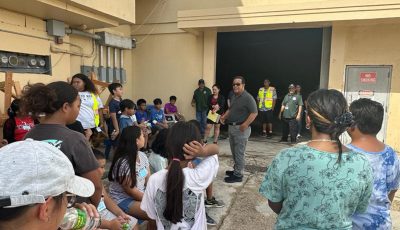Up Close program discusses Tinian divert, militarization
Militarization in the Northern Marianas was the topic of choice for this year’s Up Close program of the CNMI Public School System held at the Saipan World Resort last Thursday.
Sixty-five students from Dr. Rita Hocog Inos Jr./Sr. High School on Rota, Grace Christian Academy, Kagman High School, Marianas High School, Saipan Southern High School, and Tinian Jr./Sr. High School took part in the discussions, which focused on the proposed divert airfield on Tinian.
“If you look at the topic, it’s very relevant. This is something that’s going to affect our lives in many ways. Military had such a big presence in World War II and now their back. Not at the same capacity as they were before but they’re back here. Some people see it positively, some people don’t,” PSS Social Studies program coordinator Patricia Sablan said.
The objectives were to define and explain the political relationship of the CNMI, determine the effects of that political relationship, critique viewpoints from various stakeholders regarding proposed plans, and create and share their own informed opinions regarding these proposed plans.
To represent all sides of the militarization issue, PSS invited guest speakers such as Gov. Ralph DLG Torres, Sen. Arnold Palacios (R-Saipan), legislative assistant to Sen. Jude Hoffschneider (R-Tinian) Joseph Hocog, Northern Islands Mayor Jerome Aldan, Maj. Chris Merrill of Joint Region Marianas, Bureau of Environmental and Coastal Quality-Division of Environmental Quality acting director Ray Masga, Henry Hofschneider of Saipan Mayor’s Office, Atty. Rosemond Santos, Juanita Masga Mendiola of Fanacho Marianas, and press secretary Ivan Blanco.
“Each of the students have a theme on their table so they’re focusing on one aspect of the divert airfields to be built on Tinian,” Sablan said, “We want the students to understand the issues better.”
Each speaker interacted with the students who were divided into eight groups which focused on specific areas of the divert airfield issue such as economic, political, social-cultural, and environmental.
Merril said most of the students asked questions to build their familiarity with the topic, adding that he shared both positive and negative impacts.
“Anytime you’re going to change something, you’re going to have good and bad effects regardless of what it is you’re changing,” Merril said, “What I tried to bring out to them is it takes the wide swath of government, not just the military in this case, that has a problem that they need to solve.”
He noted that the exercise was a great way to help shape students’ thought processes and their understanding of the government.
“You’re supposed to disagree, and in those disagreements you uncover the problems. Once you uncover the problem, now you have something to solve together. That’s how we can make change happen,” Merril said.
Each of the groups listed both the positive and negative impacts of the militarization with regards to their focus area and shared it to the other groups during discussion.



























